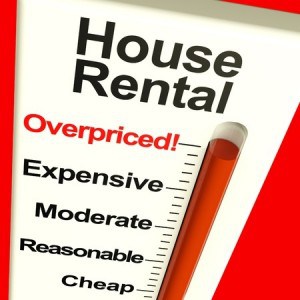How to Set the Perfect Rent Price for a Rental Property

Doing so, however, will make the tenants view the landlord as unscrupulous and they will stay away from the units. Ironically, pricing your rentals too cheap is also counterproductive. The low price will attract low-quality and at times problematic tenants.
So, just how can a landlord go about pricing his or her rental units? The following tips should offer insight on how to go about it.
8 Tips for Setting Rental Prices
Find Out What Similar Units are Charging
An effective way to determine how much to price is by finding out what houses similar to yours charge. The similarity should be regarding the number of bedrooms, square footage, location, and amenities. You can get this information from popular listing platforms like Craigslist, Trulia, Zillow, and Realtor.com. Bearing in mind that the rent price can affect how long a property stays vacant as well as the average occupancy rate, focus on those houses that do not stay unoccupied for too long and have a high occupancy rate. Chances are these units have the right rental prices.
Consider the Square Footage of the Unit
If your efforts of locating a property that matches yours prove futile, do not despair yet. You can use the nearby units to calculate how much you should price yours. All you need to do is find out how much the surrounding units charge per square feet and use that rate to calculate yours.
Set the Price Based on the Real Property Value
A common way of determining what to charge is to evaluate what the actual cost of your asset is, and multiplying it by a standard 0.11. Whatever figure you arrive at, that should be the fitting monthly rent you should demand. For instance, if the evaluation values your rental property at $ 150,000, then an ideal monthly rental rate would be $1,650. Even though this approach fails to factor in variables like the neighborhood, design features or surrounding amenities, it gives a general idea of what to charge.
Consider the Location of Your Property
Where your rental property is situated significantly affects the amount of rent you can demand. For instance, if it is in high-end markets, near prominent school districts, reliable transport network, or essential social amenities, you can attract a premium rate. That is because high-quality renters prefer staying in such areas and wouldn’t mind paying whatever amount you ask. However, if your property is in the lower class markets, where insecurity is high, and infrastructure is lacking or rundown, you will have a daunting task charging a high rent.
Look at the Condition, Size, and Layout of the Property
Besides the location, there are other factors like the size, design, and condition of the property which will affect its ultimate price. For example, a two bedroom apartment might cost less than a three bedroom one in the same area. However, if the three-bedroom unit is old or in a worn-out state, while the two-bedroom one is new and refurbished, the newer property is likely to cost more.
Inquire from Property Experts
Another useful way for you to ascertain the perfect rent is to ask credible experts in the real estate industry. These experts include property management companies, real estate agents, and rental housing associations. Since these authorities are familiar with the rental property industry, they are in the perfect position to tell you what to charge in different markets. When looking for an expert opinion, though, take the time to determine that you are indeed consulting a credible and reputable professional. Otherwise, you might end up receiving the wrong investment advice, which will hurt your real estate goals.
Ask Other Landlords
Even though industry experts will give you sound advice, in most cases you have to pay for that information. If you prefer unsolicited rental advice, why not get it from the horse’s mouth. Talk to other landlords and ask them how much they charge. While at it, do not shy from seeking their opinion on what you should charge for your property. Depending on your approach most property owners would readily give credible suggestions.
Ask the Tenants
If getting the information from the landlords proves impossible, or if you suspect what the owner told you was questionable, you could identify surrounding units that are similar to yours and interrogate the tenants there, to find out how much rent they pay.
Conclusion
By following the above steps, you should be in a position to get an average market rate for your rental property. From there, it is up to you to decide how to price your units so that they remain both attractive to high-quality renters, and profitable to you.
Source: realtybiznews.com















 Accessibility
Accessibility